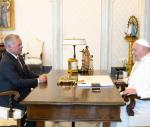You are here
Globalisation began 500 years ago today
Sep 19,2019 - Last updated at Sep 19,2019
Globalisation is nowadays a phenomenon that we all perceive as natural. We are used to buying products from any country on the globe or receiving information about any important event that occurs on the other end of the planet as it happens. However, there was a time when things were very different. There was a time when the oceans were insurmountable barriers and people, even the most educated, were unaware of the very existence of many territories and those who inhabited them. All this began to change exactly five hundred years ago today.
On September 20, 1519, five vessels with 235 men on board departed from the harbour of Sanlúcar de Barrameda (in southern Spain). The purpose of this expedition was to sail westwards in search of a passage that allowed them to circumvent the newly discovered continent of America and reach the Moluccas or Spice Islands (present-day Indonesia). Spices, currently a product of common use, were at that time a commodity as valuable as gold. Three years after their departure, on September 6, 1522, a single ship with only 18 men on board returned, sailing from the east, to the same port of Sanlúcar from which they departed. They had completed the first journey around the globe!
During their mission, the expedition led by Fernando de Magallanes (a Portuguese naval officer at the service of the Spanish Crown) discovered a passage at the southern tip of the American continent, near Antarctica, which was subsequently named after him. That passage allowed them to access an ocean they called Pacific, because they considered it much quieter than the Atlantic that they had left behind (pacífico means peaceful in the Spanish language).
The expedition suffered endless difficulties. They sailed for more than three months without contact with dry land (and therefore without being able to resupply fresh water and food), navigating towards the unknown, since no European had ever crossed those waters until then. They suffered all kinds of shortcomings and numerous casualties among their members, including Magallanes himself, who died on an island that is now part of the Philippines (an archipelago that would take its name years later from the Spanish monarch Philip II).
After reaching the long-awaited islands of the spices, the Spanish naval officer Juan Sebastián Elcano, in command of one of the only two ships which remained for the expedition at that time, decided to continue sailing westwards and to circumvent Africa, instead of going back through the same route they had already used. By doing so, Elcano’s vessel “Victoria” completed for the first time a full journey around the world.
The extraordinary value of this expedition was that it provided proof of what until then was a mere hypothesis: The roundness of Earth. Many other expeditions followed and thanks to them, the newly discovered territories could be mapped and our entire planet became known. Years later, Spain would establish the first sea route that linked three continents: Asia, America and Europe. It was through the so-called “Galeón de Manila”, which linked the Philippines with Spain, passing through Mexico.
This and other subsequent routes allowed the exchange of goods, people and ideas between the different continents, opening the door to the phenomenon we know today as globalisation.
The expedition itself was a pioneer in shaping the concept of globalisation because although it was a Spanish endeavour, its crew came from nine different countries (if we consider the current nationalities): Spain, Portugal, Italy, Greece, France, England, Ireland, Belgium and Malaysia. Those men, who lacked a common language, were able to understand each other, to work together in the hard tasks of the sea and coexist, many times in extreme situations, in the reduced space of the ships that formed the expedition.
In the long term, the feat of Magallanes and Elcano paved the way to a more interconnected world in which there are fewer and fewer isolated regions and where people, products and knowledge are exchanged and circulate in all directions. A multicultural, multiethnic and multipolar world. The world of globalisation.
As the ambassador of Spain to Jordan, I didn’t want to miss the occasion of sharing with the Jordanian public the commemoration of an event considered by many historians as the greatest navigational feat of all times. It is a curious historical coincidence that this year also marks the 50th anniversary of the first arrival of mankind to the moon. Destiny wanted to unite these two great breakthroughs in a single ephemeris. In both cases they were meant to go one step further, as the motto in the shield of Spain says: “Plus ultra” (“Further and beyond”).













